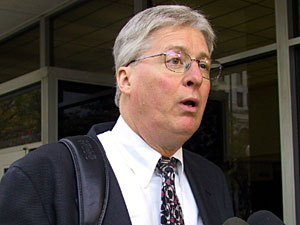Photos
Resources
Your Voice
| |||||||||||||||||||||
Judge hears challenge to Minnesota campaign finance laws
October 21, 2003
 |
| Attorney James Bopp Jr. said the contribution limits infringe on the ability of certain donors and groups to freely associate with a particular candidate. (MPR Photo/Laura McCallum) |
St. Paul, Minn. — The MCCL -- a group opposed to legalized abortion -- argues that provisions in six Minnesota statutes violate the First Amendment. They include restrictions on campaign contributions from lobbyists and large donors, and disclaimers that are required on campaign literature.
The MCCL's lead attorney, James Bopp Junior, says the laws restrict the free speech of citizen issue groups.
 | |||
"You have to file reports with the government, put disclaimers on your communications, and ultimately could be required to be a PAC. So there's a whole series of burdens and restrictions on organzations if they engage in issue advocacy under the statute," he said.
Bopp also represents the National Right to Life Committee, and has filed dozens of similar lawsuits around the country on behalf of abortion opponents.
Minnesota Attorney General Mike Hatch says the lawsuits try to gut campaign finance reform. Hatch says campaign finance laws don't stifle free speech. He says courts have ruled that money isn't speech, and laws can place restrictions on the money going to campaigns. He says without them, elections wouldn't be as clean.
"I think it would be Katie-bar-the-door in terms of what would go on next year. We've been working very hard in this country to try to get a handle on transparency, knowing who's contributing and what they're doing with the dollars and who's representing whom in terms of the issues being spoke ... if the court were to strike down these types of laws, we'd be right back into the same problems we had prior to 1993," Hatch said.
Hatch says before many of the campaign finance laws passed in 1993, nearly all races were won by incumbents. He says the laws make elections more competitive.
Dave Racer disagrees. He's a Republican who challenged Sen. Mee Moua, DFL-St. Paul, in last year's election. He's a co-plaintiff in the MCCL suit, and says the laws gave Moua a definite advantage. Racer says Moua began the campaign with money she'd raised the year before, yet he was prohibited from accepting a transfer of money from the campaign of Republican Sen. Tom Neuville.
"If you really want fair and free elections, then there ought to be a way to do it where challenger candidates can have the same kind of funding advantages, otherwise you don't really have any competitive races in these kinds of districts," he said.
Attorney General Hatch says the ban on inter-candidate transfers is designed to prevent "money laundering." He says the Minnesota laws give small donors a voice in politics.
"As the court has said, it protects the compliant politician from the heavy sway of big muscle. And clearly, the MCCL and some other groups have had that big muscle. And the idea here is to say, you can continue to have it, but you're going to have to disclose it, and you're going to have to play fair."
U.S. District Court judge Richard Kyle listened to the arguments of Hatch and Bopp for more than an hour, but didn't immediately rule on the case.
|
News Headlines
|
Related Subjects
|

